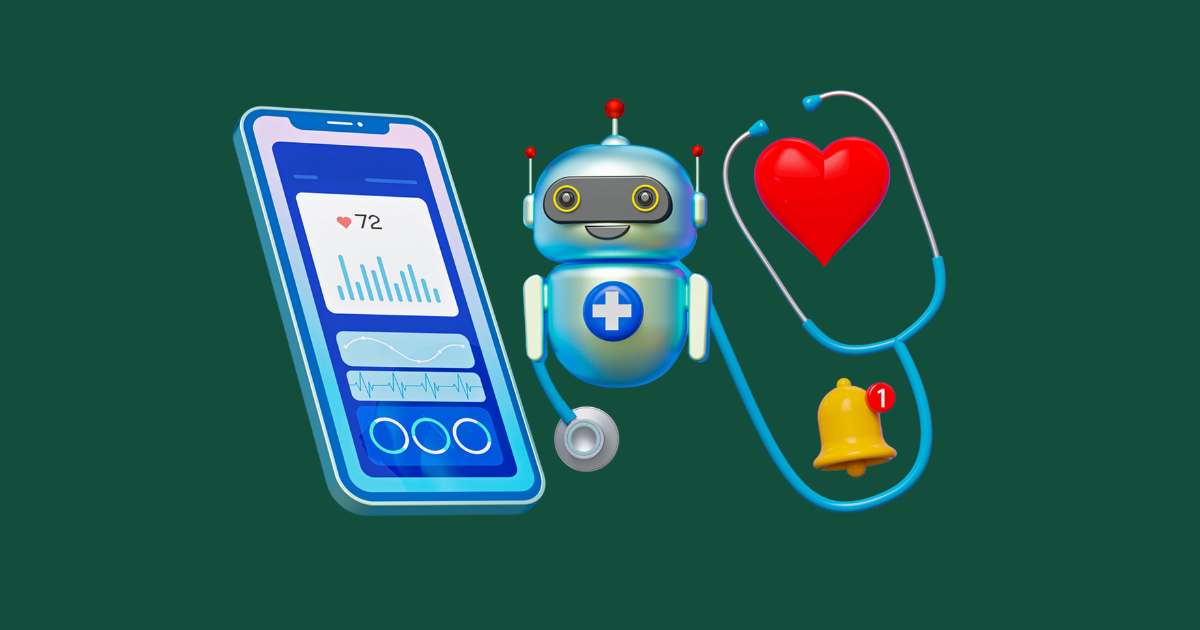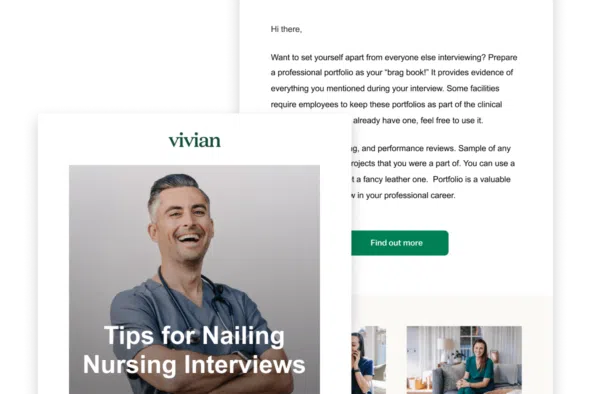Maintaining an evidence-based practice and keeping up with the dynamic healthcare arena is essential for nurses and all healthcare professionals. However, in the rapidly evolving advanced practice field, staying in the know is crucial for nurse practitioners (NPs) to ensure the delivery of the highest quality patient-centered care. Some practitioners have confided that the hardest parts of an NP’s job are being responsible for patient treatment plans and working with underserved communities. In recent years, several healthcare trends that implement technology have begun to help mitigate the heavy load NPs face.
Explore five emerging or expanding trends as we spotlight the nursing healthcare topics taking the stage for NPs in 2024.
1. Artificial Intelligence in Healthcare

Artificial intelligence (AI) is a hot topic in the digital realm and presents a significant shift in how we navigate and view the world.. Healthcare is jumping on board with this expanding technology. Among its many applications, healthcare practitioners are using AI to write great resumes and assist in their job searches. AI technology is also profoundly changing the way healthcare professionals help patients. NPs can harness the power of AI for patient data analysis and decision support, potentially enhancing the accuracy and speed of diagnoses and treatment plans.
Striking a balance between the benefits of AI and the ethical challenges it poses is a key concern of its use in healthcare. Many important questions and ethical considerations arise as the discussion goes deeper with AI and its advancements within the healthcare sector. NPs must grapple with questions related to patient privacy, data security and the potential for bias in AI algorithms.
This technology could significantly impact how nurse practitioners provide patient care. It’s a central topic in the healthcare sector, particularly regarding AI’s role in diagnosis and treatment. New technology could broaden access to innovative AI tools, simplifying adoption by NPs and the interpretation of outcomes and delivery of personalized guidance. NPs working with AI have the potential to facilitate the creation of synthetic data for training medical AI algorithms, preserving patient confidentiality and addressing data limitations when real-world data is inadequate.
Given the rising healthcare costs driven by aging populations and the increase in chronic illness, governments in numerous countries are under pressure to enhance the efficiency and effectiveness of primary care services. The need to be conscious of medical costs directly affects how nurse practitioners deliver care to their patients in the age of AI.
2. Telehealth Expansion

Telehealth, delivering healthcare services through digital means, has gained traction as a solution for increasing healthcare accessibility. Patients now have the convenience of virtual consultations, enabling them to communicate with healthcare providers through various remote digital health technologies. Digital appointments are especially advantageous for individuals experiencing mental health issues, living with chronic conditions, experiencing mobility or transportation limitations, or residing in remote areas.
Telehealth services have witnessed ongoing and robust growth in recent years, shaping how practitioners deliver healthcare. This expansion has brought about significant changes involving NPs and has highlighted both benefits and challenges while prompting regulatory changes.
Nurse Practitioners’ Role in Telehealth
Nurse practitioners have played a pivotal role in the expansion of telehealth services. Their use of telehealth has helped increase patient access to healthcare, particularly in underserved and remote areas. NPs can perform various duties through telehealth, including conducting virtual patient assessments, offering medical advice and even prescribing medications when necessary with the appropriate prescriptive authority.
Challenges, Benefits and Regulatory Changes in Telehealth
While the growth of telehealth services is promising, it’s not without challenges. Privacy and data security remain paramount concerns, given the transfer of sensitive medical information over digital networks. Ensuring the quality of care and patient satisfaction in the virtual realm is also an ongoing challenge, as is addressing issues related to technology disparities.
The rapid development of telehealth has prompted regulatory changes. Healthcare authorities and governments are working to establish clear guidelines for telehealth practices, licensing and reimbursement. These changes aim to strike a balance between promoting innovation and ensuring patient safety and quality of care.
With NPs at the forefront, the growth of telehealth services represents a transformative shift in healthcare delivery. The benefits are evident in increased access, improved care coordination and cost-effectiveness. However, challenges and regulatory changes remain essential focus areas as the healthcare industry adapts.
To maximize the benefits of telehealth, NPs should follow some of the following best practices:
- Use secure and user-friendly platforms
- Engage in informed consent
- Set expectations with patients
- Document telehealth visits
- Maintain regular follow-up
The benefits of NPs’ involvement in telehealth are multifactorial. Patients can receive timely and cost-effective care from the comfort of their homes. NPs can reach a broader patient base, enhancing healthcare access in rural and medically underserved communities. Telehealth enables better care coordination, as NPs can collaborate remotely with other healthcare professionals.
3. Virtual Healthcare Assistants

Virtual assistants and chatbots have become valuable tools in the healthcare industry, changing how facilities provide healthcare and manage administrative tasks. With the ever-increasing demands placed on NPs, they can leverage these technologies to streamline operations and enhance patient care. The following overview of virtual assistants and chatbots highlights their functions and the potential benefits and drawbacks for patients and NPs.
Virtual Assistants and Chatbots
Virtual assistants are computer programs or AI-driven entities designed to perform tasks, answer questions and assist users in various capacities. In healthcare, virtual assistants are often used for administrative tasks, scheduling appointments and providing information to patients. Chatbots are a specific type of virtual assistant that interacts with users through chat interfaces. They’re equipped with natural language processing capabilities, allowing them to have conversations with users and respond to their inquiries.
Virtual assistants and chatbots can assist with the following functions:
- Appointment Scheduling: They can manage appointment bookings, send reminders to patients and reschedule appointments if needed, freeing NPs from administrative duties.
- Patient Education: They can provide information about medical conditions, treatment options and post-visit care instructions to patients.
- Billing and Insurance: Virtual assistants can assist in managing billing and insurance claims, helping ensure NPs receive proper reimbursement.
- Prescription Refills: Patients can use chatbots to request prescription refills for NPs or their support staff to process.
NPs can leverage these technologies to enhance patient care by offloading routine administrative tasks, allowing them to focus on clinical care and spend quality time with patients.
Benefits and Potential Drawbacks of Virtual Assistants for Patients and NPs
Virtual healthcare assistants, including chatbots, offer significant benefits for patients and NPs. They improve accessibility, streamline administrative tasks and enhance efficiency. However, the potential drawbacks, such as the lack of personalization and privacy concerns, should be considered when integrating these technologies into healthcare practices. The following table outlines potential benefits and drawbacks for patients and nurse practitioners.
| Patients | Nurse Practitioners | |
| Benefits |
|
|
| Potential Drawbacks |
|
|
4. Personalized Medicine

Personalized medicine, often called precision medicine, represents a groundbreaking healthcare approach. It tailors medical treatments to individual patients based on their genetic, clinical and environmental characteristics. This revolutionary type of care recognizes that each patient is unique and that better treatment outcomes result from customization. The goal is to optimize patient results, reduce side effects and improve overall care quality with a more personalized approach.
How NPs Can Integrate Personalized Medicine into Their Practice
- Genetic Testing: NPs can incorporate testing to identify genetic variations that may affect a patient’s response to medication. For example, pharmacogenomic testing can help determine the most suitable drug and dosage based on a patient’s genetic profile.
- Medical History and Risk Assessment: NPs can conduct thorough medical history assessments to understand a patient’s unique risk factors and predispositions. This information can guide treatment decisions and preventive measures.
- Patient Consultation: Engaging in open and thorough discussions with patients about their lifestyle, preferences and concerns allows NPs to tailor treatment plans to meet individual needs.
- Patient Education: NPs can educate patients about the importance of personalized medicine and how it can improve treatment outcomes. This education includes explaining the significance of adherence to personalized treatment plans.
- Collaboration: Collaborating with genetic counselors, pharmacists and other healthcare professionals can facilitate the integration of personalized medicine into the care team. They can provide specialized expertise in genetic testing and medication management to enhance patient care.
Examples of Personalized Treatment Approaches
- Cancer Treatment: Personalized medicine is widely used in oncology. NPs can collaborate with oncologists to select targeted therapies based on a patient’s tumor genetic profile. For instance, HER2-targeted treatment for breast cancer patients with HER2-positive tumors.
- Cardiovascular Health: NPs can assess a patient’s genetic and lifestyle factors to determine their risk of cardiovascular disease. Treatment may include personalized dietary recommendations, exercise plans and specific medication regimens based on genetic predispositions.
- Psychiatric Medication: Personalized medicine can be applied to psychiatric care using genetic testing to identify how patients metabolize certain psychiatric medications. This information allows for the selection of the most effective and well-tolerated drugs.
- Rare Diseases: NPs can work with geneticists to develop tailored treatment plans for rare genetic diseases. For example, enzyme replacement therapies for patients with specific lysosomal storage disorders.
- Preventive Medicine: NPs can use personalized medicine to assess a patient’s genetic risk for diabetes or heart disease. This information can guide preventive measures, lifestyle modifications and early interventions.
- Allergies and Sensitivities: Understanding a patient’s genetic predisposition to allergies and sensitivities can help NPs advise on dietary choices and environmental modifications, as well as recommend alternative medications when allergies are a concern.
Personalized medicine is a patient-centered approach that empowers NPs to provide highly individualized care. By integrating genetic and clinical data, considering patients’ unique backgrounds and collaborating with specialists, NPs can optimize treatment plans, enhance therapeutic outcomes and improve patient satisfaction.
5. Preventative Healthcare

Preventative healthcare, also known as preventive medicine, plays a crucial role in maintaining and improving overall public health. NPs have the ability to use an upstream approach to care. Upstream healthcare is an approach rooted in the fundamental question, “What can be done to prevent this issue from recurring?” Its significance lies in the ability to proactively address health issues before they become severe, reducing the burden of disease, improving quality of life and reducing healthcare costs. Preventative healthcare focuses on avoiding illness, injuries and complications through various interventions and lifestyle changes.
Nurse Practitioners’ Role in Promoting and Implementing Preventative Measures
NPs play a vital role in healthcare by incorporating preventive measures into their holistic approach to patient care. Their responsibilities include:
- Health Education
- Risk Assessment
- Vaccinations
- Screenings and Early Detection
- Lifestyle Counseling
- Chronic Disease Management
- Community Outreach
Preventative healthcare initiatives are a cornerstone of public health, focusing on averting the onset or progression of health issues before they become more serious. These initiatives encompass a diverse array of strategies and programs, each designed to enhance individual well-being and community health. They’re proactive measures prioritizing prevention over treatment, ultimately reducing the disease burden and improving overall quality of life.
The following list provides concrete examples of preventative healthcare initiatives:
- Immunization Programs: NPs actively promote and administer vaccinations for various age groups, preventing infectious diseases like influenza, measles and hepatitis.
- Cancer Screenings: NPs encourage and conduct regular screenings for breast, cervical, colorectal and other cancers, leading to early detection and improved survival rates.
- Wellness Check-ups: NPs encourage patients to attend regular wellness check-ups to monitor vital signs, cholesterol levels and blood pressure to detect potential health issues early.
- Smoking Cessation Programs: NPs offer support and guidance to patients seeking to quit smoking, helping to prevent tobacco-related illnesses.
- Heart Disease Prevention: NPs provide risk assessments, dietary guidance and exercise recommendations to prevent heart disease, the leading cause of death worldwide.
- Preventive Counseling: NPs offer counseling on topics such as family planning, sexually transmitted infection prevention and mental health.
- Childhood Obesity Prevention: NPs work with children and their families to address and prevent childhood obesity, focusing on nutrition, exercise and healthy habits.
- Geriatric Care: NPs play a vital role in the prevention of falls, fractures and cognitive decline in older adults by assessing risks and recommending interventions.
- Public Health Campaigns: NPs participate in public health initiatives to raise awareness and educate communities about various health issues, such as diabetes, hypertension or the importance of immunizations.
Preventative healthcare is essential in reducing the incidence of diseases and promoting healthier, happier lives. Nurse practitioners are at the forefront of these efforts, working closely with patients to implement preventive measures and enhance community health.
NPs are navigating a new healthcare setting marked by trends like the assistance of AI, telehealth expansion, virtual assistance and chatbots, personalized medicine and preventative healthcare. To thrive in this evolving environment, NPs must stay informed and adaptable and advocate for their patient’s well-being. The role of NPs is continually evolving, and they play a crucial part in bridging gaps, promoting holistic care and ensuring patients receive the best healthcare possible.
Explore NP jobs and NP salaries on Vivian Health to discover new career opportunities in this growing field today.









